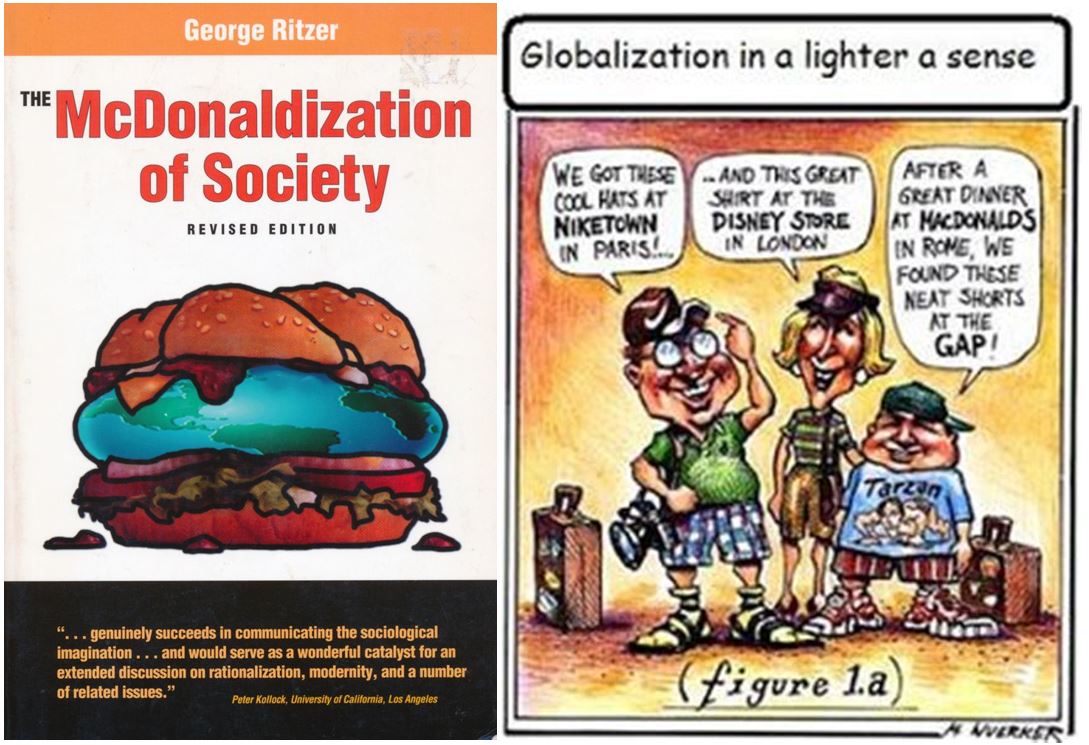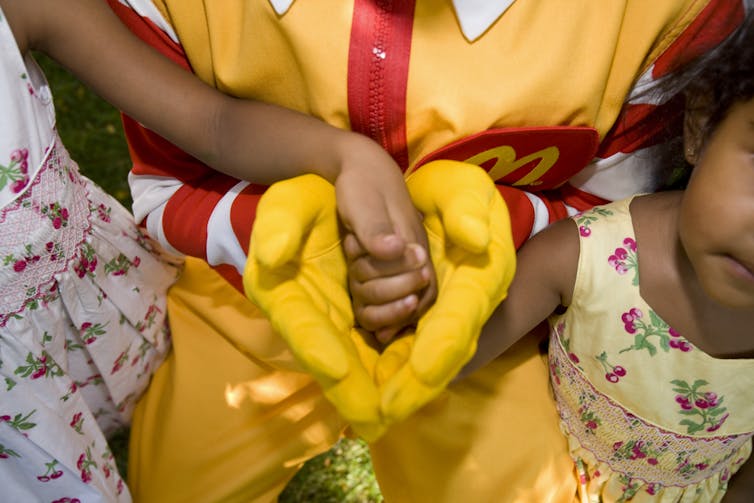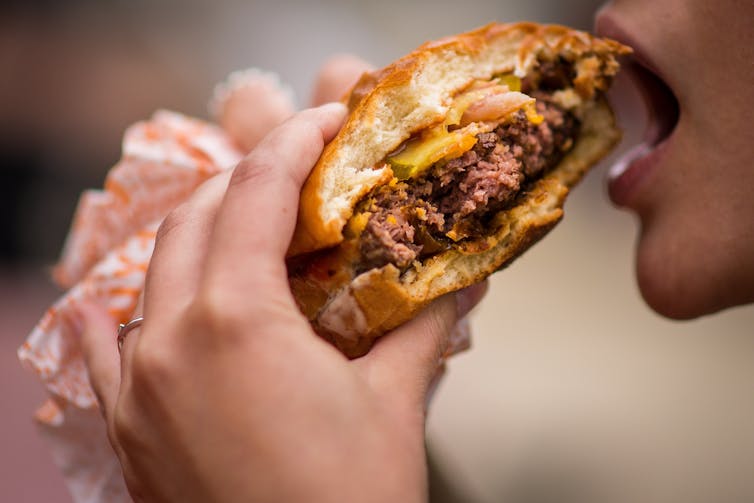
McDonaldization is the term invented by George Ritzer to describe a sociological phenomenon that is happening in our society. According to Ritzer, the four main dimensions of McDonaldization are:
- Efficiency – The optimum method of completing a task. The rational determination of the best mode of production. Individuality is not allowed.
- Calculability – Assessment of outcomes based on quantifiable rather than subjective criteria. In other words, quantity over quality. They sell the Big Mac, not the Good Mac.
- Predictability – The production process is organized to guarantee uniformity of product and standardized outcomes. All shopping malls begin to look the same and all highway exits have the same assortment of businesses.
- Control – The substitution of more predictable non-human labor for human labor, either through automation or the deskilling of the workforce.
Norah Campbell, Trinity College Dublin, and Francis Finucane, National University of Ireland Galway
Stepping into a McDonald’s in Dublin, the front window is covered with little yellow cut-outs of children’s hands. Donation boxes are displayed prominently on the counter top when you order. By donating €1 with your Happy Meal order, McDonald’s can transform you, body and soul, by putting tasty food in your child’s belly and a warm glow in your heart.
The donation goes to Ronald McDonald House, a charity whose Founding Mission Partner is McDonald’s. The charity offers vital accommodation to the parents of sick children. Its latest fundraising campaign aims to build a 53-room house at Ireland’s new national children’s hospital. A vital, noble cause, but how and why is it related to the burger and fries you just bought? Let’s step back a little and view the fuller picture.
McDonald’s has sustained catastrophic brand damage in the last two decades, as the tide turns against both the industry of fast food and its brand behemoth, due to health, labour and environmental criticisms. McDonaldisation, McJobs, McJunk, McLibel are all common currency to describe the low-wages, precariousness, slick marketing and poor foods, cultural imperialism and economically homogenising force that McDonald’s represents.
Of course, there have been recent moves on the part of the brand to make its Happy Meals more healthy, but this step blindsides us from McDonald’s most important strategy of recent years: the dedicated way the brand builds an enchanted, seamless, full sensory experience. To put it simply, it’s hard to order those carrot sticks in a place that smells of delectable French fries and has touch screen menus that foreground big strawberry sundaes.

RonaldMcDonaldHC/Flickr, CC BY-SA
Further undermining its “healthy” new image, consumer research has demonstrated that adding healthy additions to what is otherwise an unhealthy eating environment actually prompts people to eat even more unhealthily. McDonald’s sales say it all: while they have added salads and fruit to their menus, this is only a tiny fraction of their market. This reflects the deep disconnect between their corporate social responsibility speak and their strategic ambition to “convert casual to committed customers” and “enhance snack and treat offerings”.
From marketing to PR
Aside from straight-up marketing and advertising, McDonalds, like other corporations, relies on public relations strategies that are less tangible and take indirect paths into our consciousness. McDonald’s PR positions the company as caring and moral, and as having the same concerns as the community.
This happens through a cognitive process that every first year business student learns: classical conditioning. Take a thing that evokes an innate, intense emotional response (a cute puppy, a sunset, a sick child), and pair it with a thing that doesn’t evoke the same response (a toilet roll, a perfume, a fast-food restaurant). Over time, a powerful meaning transfer happens. The second thing comes to evoke an emotion similar to the first.
McDonald’s cannot advertise the golden arches on hospital buildings, or persuade paediatricians to give Big Mac stickers to kids. Such direct methods are technically legal in most countries in the world but would backfire because the brand commands so little trust or respect.
Instead, McDonald’s frames itself as a facilitator through which community can gather. It “donates” money to charity. It “allows” the charity to place permanent collection boxes prominently on its counter tops, helping customers to help this worthy cause. It “gives” a portion of every sale of its Happy Meal. It “lends” the charity crucial expertise through having McDonald’s management on the charity board of trustees. It “celebrates” its employees who volunteer their time and energy to the cause. It “helps” organise events like the “Pop Tab” campaign, which encourages children to collect tabs from soft-drink cans in exchange for a pledge from the company. It “gives permission” to Ronald McDonald House to use McDonald’s brand assets and other corporate resources.
It’s a classic PR strategy – you appropriate the signs and meaning that comes from the roots of community and background the brand itself. This puts the brand in the character role most loved in all mythic tales: the humble, generous and deeply kind servant, only too happy to help. McDonald’s successfully uses the gratitude parents naturally feel for what should be a basic right – to be beside their children when they are sick.
The link that Ronald McDonald House creates between itself and sick children is not just positive, it is sacrosanct. The final result of this 40-year PR strategy? Taking care of sick children seems like an impossible task without the help of a fast-food brand.

Maryland GovPics/Flickr, CC BY
Who’s responsible?
In most countries there are not enough public resources to care for the carers of sick children. They are “externality costs” that the health system cannot, or chooses not, to take on. The medical model draws a boundary around the sick child as the physical body in the hospital bed, taking away the tendrils that attach them to what sustains them emotionally and physically: their family.
Covering the cost of this seems to be off the table for public health systems. As a result, we outsource this extended care to the highest bidder. Yet our governments absorb other externality costs: health budgets pay, for example, for the consequences of obesity. There is a causal link between food brand marketing and obesity, but no food company incorporates that cost into its bottom line.

Napocska/Shutterstock.com
Concerns about the presence of Ronald McDonald in children’s hospitals don’t arise from a lack of appreciation for the good work the charity does, nor even from anti-commercial sentiment or smug distaste for a junk brand, but out of recognition that the dangers to public health are unacceptably high, however pernicious and unquantifiable they are. One could target chocolate and football or beer and rugby instead, but the provision of indirect care to the sickest and most vulnerable citizens within Ireland’s flagship paediatric hospital by Ronald McDonald House is a good place for the frontline in the war on obesity to be drawn.
We pay for obesity. For example, Ireland’s cost of obesity is predicted to reach €5.4 billion by 2030. McDonald’s support of the Ronald McDonald charity in Ireland, meanwhile, is €90,000. So from one perspective, McDonald’s is not giving at all, but taking. McDonald’s is a social, fiscal, healthcare burden in Ireland and presumably everywhere else it sells its delicious, convenient, cheap food that is high in sugar, salt and fat.
Our failure to mitigate this is symptomatic of a moralistic view of obesity as a personal choice, despite the fact that the nature of the spread of the obesity epidemic is also down to dietary environmental factors, such as the widespread introduction of cheap and potent sweetening agents such as high fructose corn syrup.
McDonald’s should be less concerned about their public relations and market share and more concerned about a changing sentiment. There is ever growing public support for the implementation of ambitious and sweeping public health initiatives like complete bans on marketing junk food to children and minimum unit pricing for alcohol. Legislators and policy makers should therefore feel encouraged to do their bit to protect us from these undeniable harms.![]()
Norah Campbell, Assistant Professor in Marketing, Trinity College Dublin and Francis Finucane, Professor of Medicine, National University of Ireland Galway
This article is republished from The Conversation under a Creative Commons license. Read the original article.




Comments are closed.